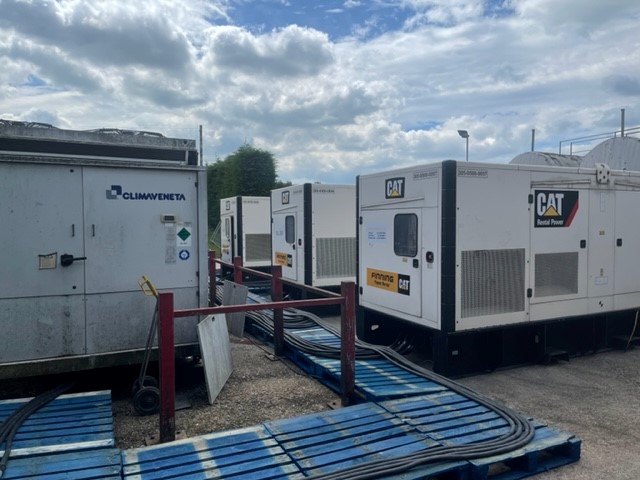Earlier this year the UK government’s Department for Business, Energy and Industrial Strategy shared its ‘reasonable worst-case scenario’ that the nation may face an electricity shortfall this winter that could result in days of power cuts.
We’ve already seen a sharp rise in demand for the purchase and rental of back-up power systems as our customers from across industries, including data centres and telecommunications, make plans to mitigate their risk and ensure energy resilience and continuity. Alternative energy sources such as back-up generators and self-generation systems are already starting to play an increasingly important role in mitigating energy risk. For all these businesses any loss of power, even for a short time, can be highly disruptive and extremely costly.
This year saw the UK record its hottest day since records began, with the Met Office warning that extreme weather conditions – such as extreme heat or cold and flooding – are set to become more commonplace because of the impact of climate change. This is bad news for data centres. To put it into context, both Google and Oracle’s London-based data centres went offline during the heatwave in July, with both citing cooling issues as the cause for the severe outages. Now as we approach the cooler months, data centres must also prepare for a worst-case scenario which could involve mandatory power cuts to ensure the grid has sufficient power to keep the country’s homes and businesses up and running.
Given the seriousness of the risk, it is critical data centres are prepared and have the systems (and equipment) in place to mitigate power outages or sudden losses. As well as the downtime caused, sudden power loss can damage equipment and corrupt data. This, in turn, leads to more downtime and expensive maintenance, and potentially the complete loss of some systems if the data corruption is irrecoverable.
And while most data centres already have contingency back-up systems in place – new legislation putting the onus on operators to self-generate during peak times – combined with the threat of extreme weather and risk of power cuts is forcing others to accelerate reviewing their back-up systems to ensure they’re adequately resourced.
Outages are already relatively common and increasing, with around a third of data centres experiencing some level of outage in the last 12 months. In line with the increase, we’ve seen a sharp rise in the number of enquiries, in particular for our rental systems, which are up around 20% on last year. This rise clearly shows that industry is taking the risk seriously and are looking to invest to ensure energy stability now.
As the price of energy continues to climb and supplies come under strain in the winter months, Ireland has already legislated that data centres must self-generate power during peak times as for the government to avoid having to implement blackouts for consumers and other businesses. This legislative change has acted as a key driver for firms in Ireland commissioning back-up systems to supplement their existing power network, with UK firms now beginning to catch up. We’re beginning to see a shift in customer behaviour in that they are starting to plan much further ahead than they normally would, and this is undoubtedly due to the risk of power shortages and the increase in news on the topic.
Power rental vs purchasing
Renting in emergency roll up power application – delivering supplementary gen-sets to site installed on a truck or trailer – is becoming increasingly the most popular option for many companies, compared with a full install of a supplementary back-up power system. Here we look at the benefits of renting a back-up power system:
Cost: Renting avoids a large-scale financial investment, maintenance and other costs and provides companies with the right piece of equipment, so it’s ready to kick into action when its needed – and is far more efficient than purchasing a unit that will slowly depreciate while not in use.
Latest technology and performance: Renting a power solution also gives firms access to the latest models of generators, built with state-of-the-art technology for the best levels of output performance and efficiency. This option also provides companies with the flexibility to rent equipment for the short, medium or long term.
Specialist service and support – when you need it: With the right supplier on board, companies can benefit from round the clock expert support throughout the project to ensure the right generators are specified to meet operational needs. Where on-site support might be needed, this can be carried out responsively to minimise downtime.
Regulatory compliance: The industry is well regulated and working with a trusted, expert rental provider gives customers peace of mind that the equipment complies with regulations and has been subject to all the necessary safety checks. Additionally, the outsourcing of product responsibility and legal compliance costs, means the risk to the company is minimised.
Sustainability: One of the reasons why renting is growing in popularity across all industries is because it is also the most sustainable choice. Renting equipment not only minimises environmental loading, but it also capitalises on increased resource utilisation and efficiency. The ‘sharing’ of equipment instead of owning also reduces capital investment for firms as well as giving access to the most modern, eco-efficient equipment. Renting also minimises transport and consequently reducing costs and carbon emissions.


